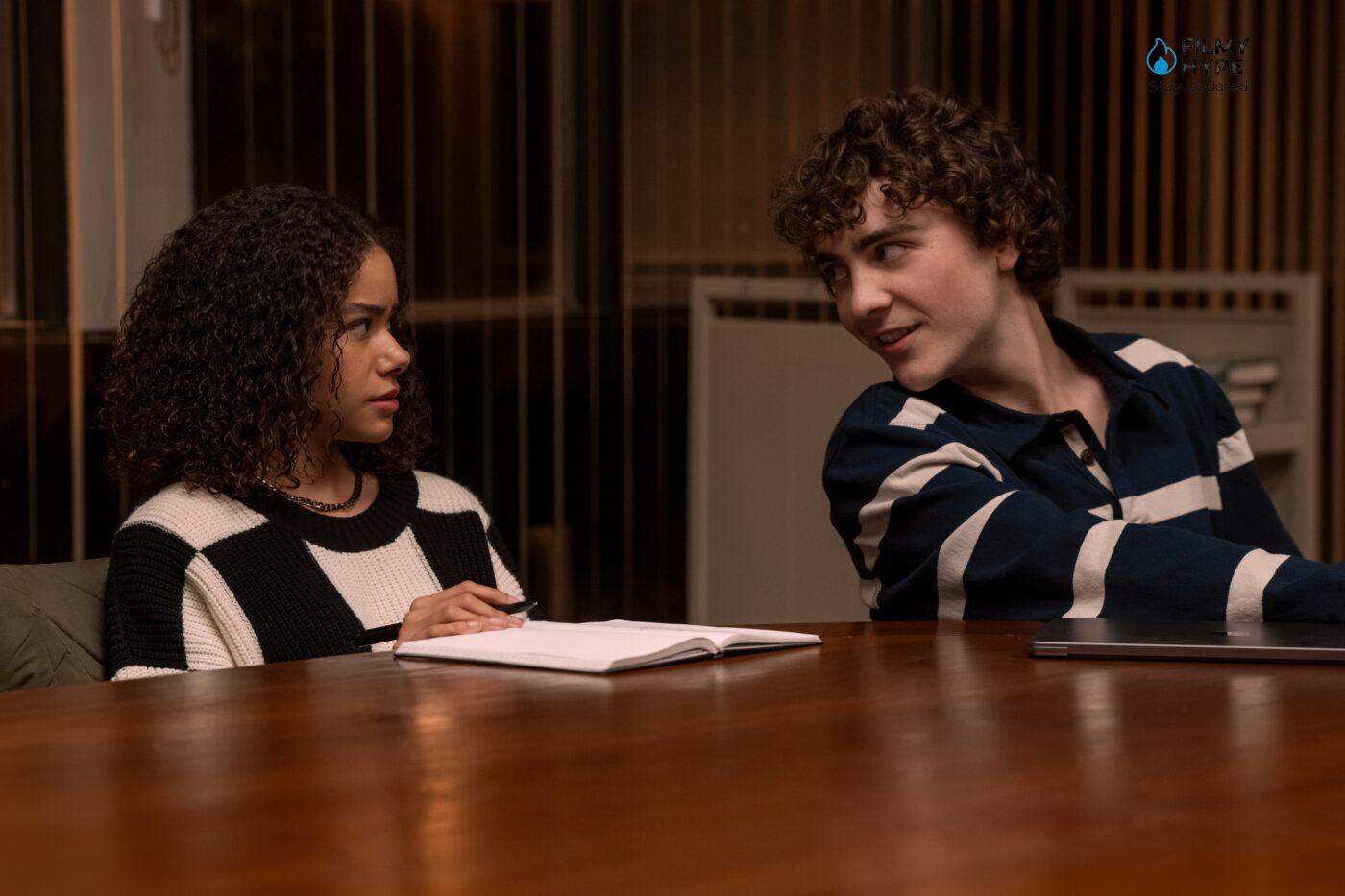Ginny & Georgia Season 3 Review: Intense and Deeply Credible Interpretations
Ginny & Georgia Season 3, available on Netflix from June 5, 2025, marks a turning point for the series. The family drama intensifies, with Georgia (Brianne Howey) being arrested for murder during her wedding, an event that upsets the lives of the Millers. Ginny (Antonia Gentry), now more mature, faces the consequences of her maternal actions. At the same time, new characters such as Wolfe (Ty Doran) and Tris (Noah Lamanna) enrich the narration, offering a compelling and complex plot. Two years have passed since a tumultuous twist in which Georgia, in the middle of the party after the wedding with Mayor Paul, was arrested and loaded onto a police vehicle on charges of murder. On June 5, we found her exactly where we left her: in prison, ready to face a trial that could even end with a life sentence.

It is made up of 10 episodes of one hour each, very dense and intense as has always been this drama that mixes the atmosphere of Desperate Housewives to those of A mom for a friend and then it becomes another thing, a two-part story that reveals the pitfalls of a mother-daughter relationship that has not won or won. The absolute protagonists of Ginny & Georgia always remain Brianne Howey and Antonia Gentry, the first problematic mother, self-confident, ready for anything to defend the stability of her family; the second teenager in crisis, who vents her anger and fears with self-harm and is divided between the desire to love her mother despite everything and the desire to discover her cards, to accept her (and maybe even a little hate her) for what she is. That is, an unstable person, sometimes narcissistic, who has come to kill and steal on more than one occasion to give herself and her children a sort of balance.
Ginny & Georgia Season 3 Review: The Story Plot
The second season of Ginny & Georgia ended with an epochal twist. Georgia (Brianne Howey) was arrested on the day of her sumptuous wedding with Paul (Scott Porter), the mayor of the city of Wellsbury. The police accuse him of voluntarily killing Tom (Vincent Legault), Cynthia’s husband (Sabrina Grdevich), suffering from an incurable disease. Little Austin (Diesel La Torraca) is the only one who knows the truth. He attended the event and saw his mother suffocate the man with a pillow, and he is so grieved that he confesses everything to his sister Ginny (Antonia Gentry). With the mother in prison, the respective fathers of the two boys do their utmost to stay close to their offspring. Gil (Aaron Ashmore) takes care of Austin while Zion (Nathan Mitchell) chooses to actively take care of Ginny. Too bad that the diabolical and violent Gil, who made Georgia’s life a real hell, certainly has no good intentions. The man tries to plagiarize Austin by leveraging his guilt to put his mother in a bad light and drive him away from her. Her plan becomes a real obsession: she goes to visit Georgia at the penitentiary and swears that she will make sure that her son never wants to see her again.
Ginny & Georgia Season 3 Review and Analysis
The third season opens with Georgia in pre-trial detention, forced to face a murder trial. Ginny, in an attempt to understand the truth and find a balance, enrolls in a poetry course, where she meets Wolfe, who soon becomes her new love interest. Marcus (Felix Mallard), Ginny’s ex-boyfriend, struggles with depression, while Max (Sara Waisglass) explores new relationship dynamics. Abby (Katie Douglas) faces self-esteem issues, and Norah (Chelsea Clark) distances herself from the group, suspecting Georgia’s actions. Finally, Mayor Paul is torn between love for Georgia and the political implications of the process. The choice of focus on the Georgia process gives the season a darker and more reflective tone. However, this narrative direction slows down the rhythm of the series, moving away from the balance between lightness and drama that had characterized the previous seasons.

For example, classroom scenes, although intense, sometimes appear excessively prolonged, diluting the overall emotional impact. The legal drama thus takes away space from the teen and familiar component, creating an emotional detachment effect and inserting itself in a dissonant way into the original and fresh tone of the show. In this third chapter of Ginny & Georgia, characters like Max and Abby get more attention, allowing actors Sara Waisglass and Katie Douglas to shine. Max brings a wave of energy and humor, while Abby offers a sincere representation of adolescent difficulties. However, the expansion of their stories sometimes diverts attention from the main plot, creating a less cohesive narrative. In this sense, the deepening of these characters enriches the narrative world, but risks fragmenting the attention of the viewer. And in particular, some subplots – such as Max’s relationship or Abby’s insecurity – seem not to flow into what is at the heart of the series.
The third season addresses important topics such as mental health, identity and the complexity of family dynamics: Ginny explores her identity through poetry, while Marcus faces depression. However, the approach to these issues is sometimes superficial, lacking in depth, and risking simplifying complex issues. The desire to represent diversity and youthful unease is commendable, but not always supported by coherent and in-depth writing. Some narrative arcs seem more functional to an inclusive agenda than to a realistic development of the characters. As a result, potentially touching moments end up appearing constructed or not very credible, rather than really exciting. The third season of Ginny & Georgia, compared to the previous ones, changes the pace ineffectively by adding many, too many events that tire the narration. An unpleasant chaos in which problems are piled up seamlessly.

Georgia’s tormented past, persistently presented, does not enrich the story, but it becomes an explanation of yesterday, often illogical, to justify its actions today, equally illogical. Family quarrels and discussions between mother and daughter, which have always been the strong point of Ginny & Georgia, have been replaced badly by a new drama, the judicial one, which lasts for a long time. In short, the substance is always the same, but the balance between comedy and tragedy, episode after episode, appears severely compromised. It is not enough to show Georgia under house arrest while scrutinizing the ridiculous neighbor with binoculars. Likewise, seeing her plow the courtroom in a beautiful formal dress, the same one she entered the prison in, makes it very clumsy. As if a certain sense of irony, which has always marked this series, melted into farce.
For the topics covered – the debate on mental health focuses on the characters of Ginny and Marcus (Felix Mallard), the one on emotional instability and eating disorders in that of Abby (Katie Douglas) – this new season of Ginny & Georgia remember more 13 Reasons Why, another generational cult of Netflix that spoke of cyberbullying and its consequences, which not Gilmore Girls, which has often been mistakenly compared. Ginny and Georgia are not Lorelai and Rory: if the latter overcome any difficulty thanks to the strength of their bond, the former, precisely because (and despite) the good they want, often end up hurting each other. The only point of contact between the two series is that, just as Rory has often found herself parenting her mother, she too became a parent at 16, as Brianne Howey’s Georgia – even Ginny ends up looking after everyone, often forgetting about herself.
When Georgia finds herself facing the trial for killing, from her point of view for human piety, a dying man, asks both children (there is also Austin played by Diesel La Torraca) to keep its secrets: does so with the attitude of those who believe they are right and without asking questions about what that request means for Ginny and Austin. The two boys love their mother but suffer the same; they love her, but for her they suffer, they would like to see her fulfilled, happy, and out of trouble, but, intimately, they know that it is not possible. The relationship between Georgia and the children opens up all the meaning and power of this third season, which continues throughout its course on the path of irony and crime to exonerate (or not) the protagonist from the murder charge, but at the same time explore relationships between other co-stars, such as that between Ginny and Marcus, abruptly interrupted to take care of his depression, she of his torments and the volcanic Maxine (Sara Waisglass) with Silver.
Ginny & Georgia Season 3 Review: The Last Words
Ginny & Georgia’s third season attempts a qualitative leap, focusing on more mature tones and complex social issues. The interpretations of Brianne Howey and Antonia Gentry remain magnetic, capable of holding even the most redundant moments. However, the weight of the legal plot stifles the narrative rhythm, and the lack of lightness penalizes what made the series truly enjoyable. Secondary characters grow but are not always convincing, while emotional tension sometimes ends up looking built on a table. There is ambition, but also a lot of dispersion.









